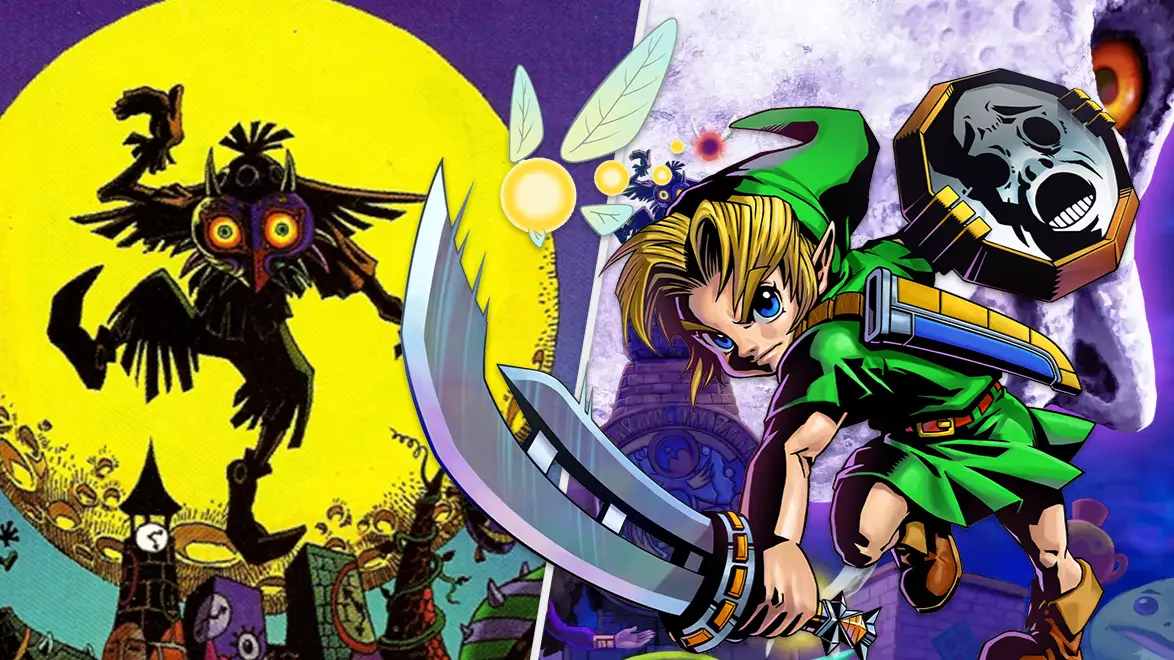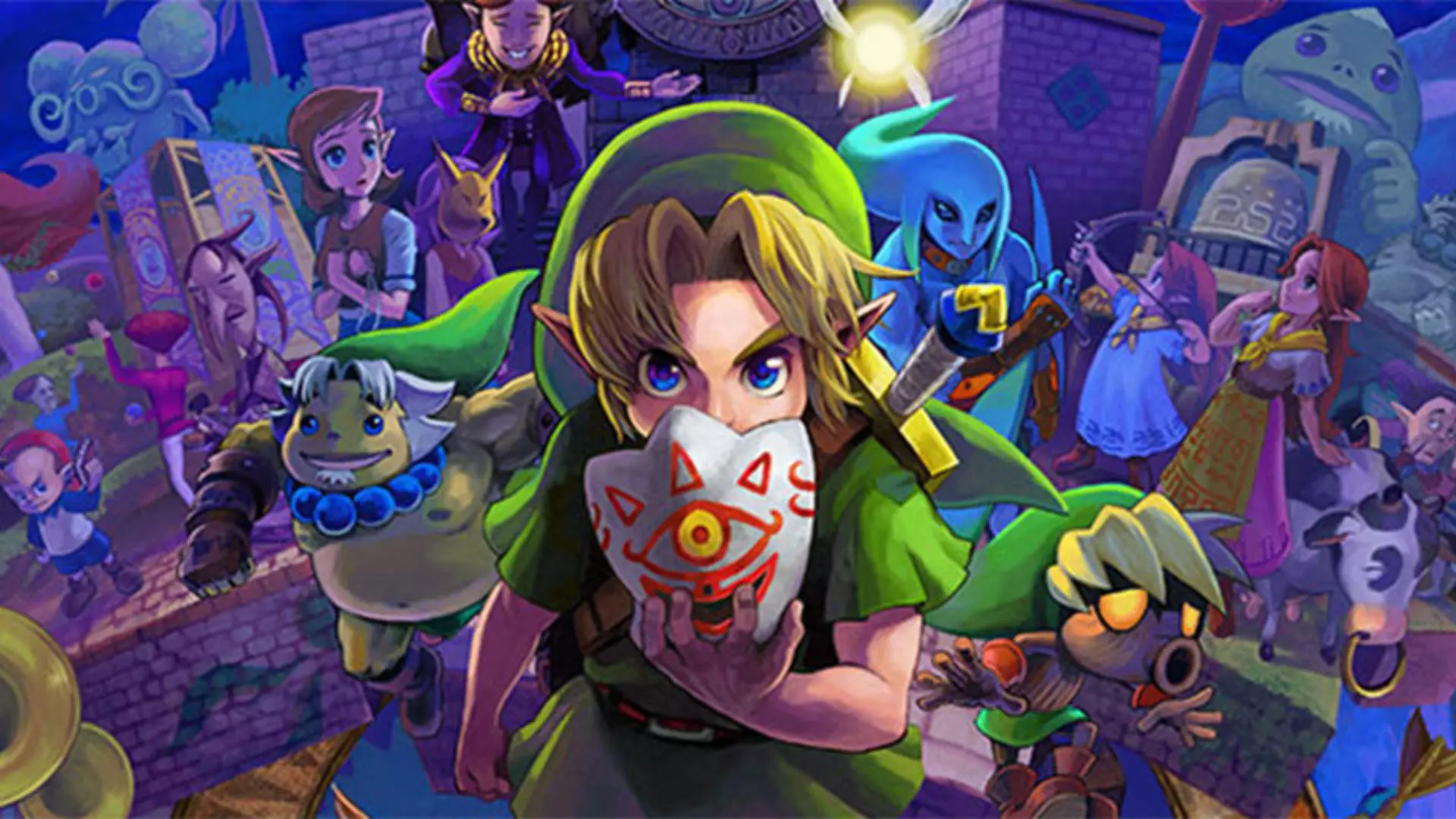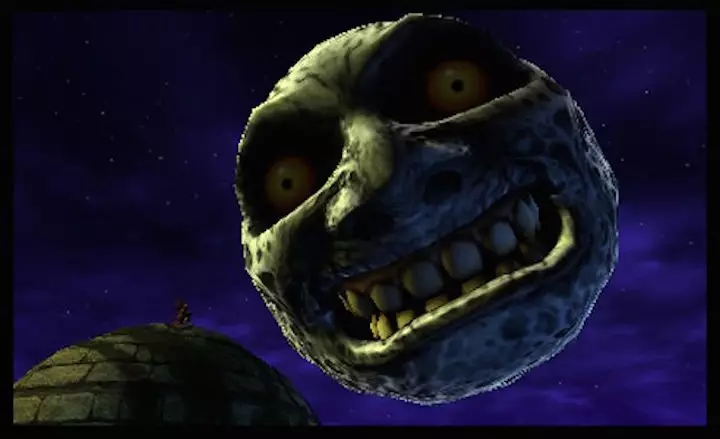
Can you imagine having to be the sequel to The Legend Of Zelda: Ocarina Of Time? Nintendo's 1998 classic casually redefined video games, changed lives, and was generally hailed as The Greatest Thing To Ever Have Existed, Ever. I wouldn't want to be the guy that follows that.
But Zelda couldn't end with Ocarina Of Time. There were more stories to tell, and Nintendo wanted a sequel, so Eiji Aonuma and his team had roughly two years to deliver a follow-up. How do you develop an adventure as epic and grand as Zelda's Nintendo 64 debut in such a short amount of time? You don't. You go weirder, smaller, and so much darker than anyone could have predicted.
The Legend Of Zelda: Majora's Mask is absolutely nothing like its predecessor. Therein, I think, lies its greatest strength. It's a bold, beautiful sequel underpinned by an oppressive sense of melancholy that acts as a constant companion to Link from start to finish. Zelda has dabbled with darkness since: Twilight Princess went to some fairly bleak places, and the entirety of Breath Of The Wild is based on the aftermath of a massacre, more or less. For my money though, the series has never quite replicated the unsettling and deeply disquieting aura of Majora's Mask.
Advert
Nintendo makes it clear from the first minute that Majora's Mask is not going to be a traditional follow-up to Ocarina Of Time. The sequel's title screen shows the eponymous mask swirling in a black, silent void. That's in stark contrast to the iconic Ocarina Of Time title screen, in which Link rides Epona through a field to a soothing piano medley.
Once we're into the adventure proper, Nintendo forces us to watch as misfortune slaps Link around like a sack of old potatoes. His horse is robbed - we're led to believe murdered. Then Link falls down a hole and maybe possibly breaks his neck and dies, depending on which YouTube theorists you talk to. As if that wasn't enough for the Hero of Time, he's introduced to this potential afterlife by being transformed by a vengeful demon into the kind of weak and useless monster that he wouldn't have wasted a second arrow on in Ocarina Of Time. Talk about a crap day at work.

Things only get stranger and altogether darker from there. Link soon learns he has three days to stop a moon with a face that looks like it was carved from Satan's left butt-cheek from crashing into the Earth and wiping out every man, woman, and child for miles around. No pressure, then.
Advert
Majora's Mask's three-day-cycle has long been a barrier for a lot of gamers who found it needlessly stressful and invasive, but I feel it only adds to the game's inimitable vibe. Too many video games are content to tell you that you're in a race against time to save the world, but will happily leave you to piss off and play Gwent, go fishing, or get drunk in a bar.
There are plenty of diversions and minigames in Majora's Mask, yes, but that clock is always ticking. The moon is always overhead, getting closer every minute. Even though you can always nip back in time and reset the cycle, it's hard not to feel the weight of every second. Majora's Mask makes your moment-to-moment decisions matter in a way no Zelda game ever had, or has since.
It would be remiss of me not to mention Termina itself, a distorted and strange land that's about as far away from Hyrule as it's possible to get. The deep blue lakes and rolling green fields of Ocarina Of Time are gone, replaced by poison swamps and overcast beaches. It's far smaller than Hyrule, but that only gives us a chance to become that much more familiar with the world and characters as they live out the same three-day schedules over and over and over again. There's a giant moon hanging in the sky that's getting closer every day, sure, but even looking past that there's this pervasive, unshakable sense that something is wrong with Termina. Something about this world just doesn't fit, and, even as the credits roll, you never can quite put your finger on what it is.

Advert
The cast of Majora's Mask remains the best in Zelda history, by the way. From the Skull Kid, a lonely child with a burning internal hatred that threatens to tear the world apart, to the spectral hand that lives in the loo of the Stock Pot Inn and just wants to wipe its pooey bum. Truly, the range of personalities and motivations crammed into this one game is ridiculous.
You tell me you don't get a lump in your throat when you visit these characters in the final moments of the last day and see many of them begging for their lives. This is a Nintendo game, and we see the owner of Romani Ranch gloomily take her little sister to go inside and wait to die. Good lord. We're invited to learn everything we can about these people in the span of three days, only to be rewarded with a deeply unsettling front-row seat to their final moments. Majora's Mask constantly, subtly provides you with the drive to save this world, simply by making you feel like a part of it.
That just might be my favourite thing about Majora's Mask: it's willingness to leave so much unsaid, so many mysteries unresolved. The exact nature of Termina, whether or not Link lived or died, who the Happy Mask Salesmen really is and what he wants - these are all things that fans debate on the internet to this day. I suspect Nintendo could have churned out Ocarina Of Time Part II easily enough, given more time, but I'm so glad it didn't. What we got was so much better, so much weirder, and so much more beautiful. What we got was The Legend Of Zelda: Majora's Mask.
Featured Image Credit: Nintendo
Topics: Feature, GAMING, Nintendo 64, Nintendo, The Legend of Zelda